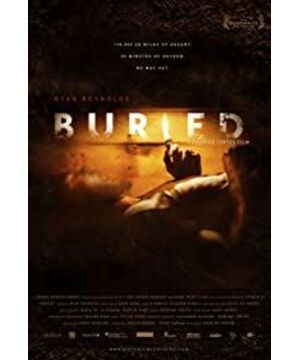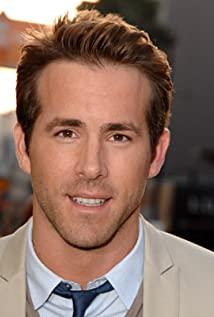When the film opened, it was pitch black, and only a long, heavy, rapid and irregular gasp accompanied by a rough rubbing sound made people feel the panicker's deep panic and struggle. There is no image, but it is enough to make people feel the closed space and the tension of almost collapse in emotion. Beginning with the fire of the zippo lighter, the whole movie, 94 minutes, is the story of a man in a coffin.
This is an American, a hired driver of a multinational company. He was hijacked somewhere in Iraq and buried alive in the ground. The robbers left him with a flashlight, a mobile phone, two light sticks and a knife. He also has a small pot of wine, a bottle of medicine and a lighter. The robber asked him to call to raise 5 million US dollars.
The background of the whole story is not terrorist attacks or retaliation against American soldiers, but just a process in which an Iraqi took a criminal path after losing his job due to the expansion of a US company in Iraq. In the eyes of this civilian robber in Iraq, all Americans are the same. They are not ideological conflicts or any so-called human rights and ideological struggles promoted by current political struggles. It's just the most primitive and basic requirement, money. In the eyes of this robber, Americans are rich. But from the entire process of hostage self-rescue, what the film shows is that as ordinary Americans, they are equally poor and have no guarantee of life.
Throughout the process of struggling to save himself, the American named Paul called 911, the FBI, the company he served, his family, friends, etc., all suffered varying degrees of indifference, shirk responsibility, and bureaucratic bureaucracy. The film has three plots that make people feel shocked and sad. Calling 911 to ask for hold on and calling the FBI to ask for clarification of the department is nothing new. However, he called his friend and only asked the other party to report the number he dialed, but he was rejected only because he was emotional and not polite. Through this mocking dialogue process, people feel helpless and indignant as the protagonist feels deep despair. But in real life, how many times have we played these two roles. The second one that was more impacted was that his company did not actively find a way to rescue him after he called for help and learned that he was buried in a coffin in the desert. Instead, he asked him to accept a recorded conversation on the phone and asked Paul to admit it. He violated the company's agreement to have an intimate relationship with the company's internal employees, and settled the renewal of his labor contract on the spot, so that after Paul's death, they did not need to pay for his family insurance. Such a conversation extremely reflects that the company in the current society is completely controlled by capital relations, without any human affection or morality. In the end, the final blow of the director's heartbeat was that the FBI called Paul when the coffin was almost overflowing in Sha Ma, they were about to find him and asked him to hold on. Let Paul, who had already decided to wait for death, rekindled hope. But they actually got the wrong object, and they found another one. It really made Paul ridicule him when he died. The final ending sound is the FBI's helpless sorry, this kind of sorry fills the entire film. This kind of sorry has sympathy as a person, excuses as an institution, and helplessness with empathy. How many misunderstandings, how many hopes vanished in the "sorry". I remembered a word I don't know who said, I'm sorry for everyone in this world. Others, family members, and yourself, when you cannot be controlled by yourself, how can you have the power and possibility to assume and fulfill responsibilities.
Through this process, the main theme of the film may be to reflect the loneliness and helplessness of individual survival in modern society. Unlike the ending I guessed during watching, the last video that Paul took to his family was not passed to the hands of the robbers, nor moved by it. It did not present the idea of "there is true love in the world, and true love in the world". There is no hope left to people, but all kinds of disputes between the world and nations may still be resolved because of love. What the director wants to express is the complete despair of human development. Individuals live in a group of bureaucratic, paralyzed, and various institutions that have no sense of responsibility or morality. The relationship between people is beyond the scope of self-control. From any individual situation, they are worthy of sympathy, but the contradiction formed between them has reached the point where it is irreversible and irresolvable. Human indifference can no longer be warmed up by self-motivation. The whole film makes people feel a kind of despair for the development of human society, just like Paul struggling in a coffin. The world is small and dark for you, and you don't know what is going on outside. The means of survival you rely on is technology. The development of science and technology seems to have brought you unlimited vitality and possibilities. But it is also a tool for institutions and others to rule you. The robbers used this mobile phone to control his behavior and asked him to shoot self-harm videos to threaten the US government. His company also used his mobile phone to let him suspend his obligations to him when he could not fight back at all. All kinds of institutions that you think you can rely on, or institutions that have always claimed to make you trust, make you dependent, and serve you. When you are in a difficult situation, these few phone calls have clearly destroyed you. This fantasy. The conversation scenes of all these calls are so familiar in our real life. But only in this extreme crisis scene set by the director can people feel how helpless and lonely we actually are.
The relationship between husband and wife, the relationship between children and parents, is always sensitive, fragile and hypocritical in the process of gradually losing self-control and constantly trying to find oneself. Only when the most basic survival of a person is threatened will he return to the most peaceful state. We all understand, but we can't get rid of it. This is naturally an important part of the connotation of social life relationships that the film needs to reflect. Similar movies are also reflected in a similar movie BARBEL (Chinese name Tongtian Tower) played by Brad Pitt.
The film cleverly uses an underground coffin to extremeize and symbolize the plight of modern people's lives. At the end of the film, when the camera stretches infinitely from above the coffin, it shows that the living space of modern people is a narrow abyss. At the end of the film, Paul was told in a hopeful moment that all life was just a misunderstanding. What he lost was the hope of body and soul. This ending is very heavy. But with those words, tragedy can be thought-provoking.
The world has developed to this stage. The competition and hatred among nations has been continuously deepened with the expansion of economy, capital, population and resources. Don't trust the promise of any so-called institution. To survive in this world, you need the ability to judge yourself.
(First published on Mtime.com, of course myself:))
View more about Buried reviews











